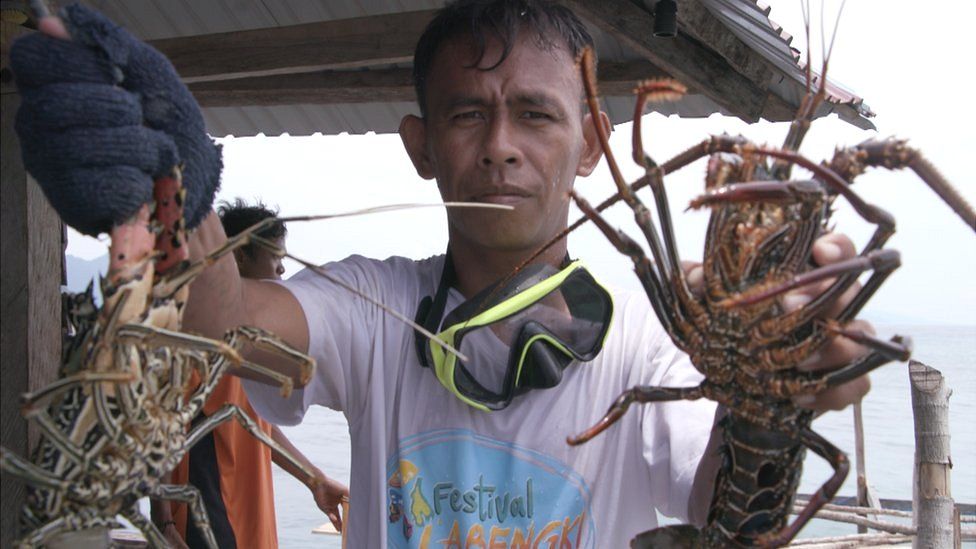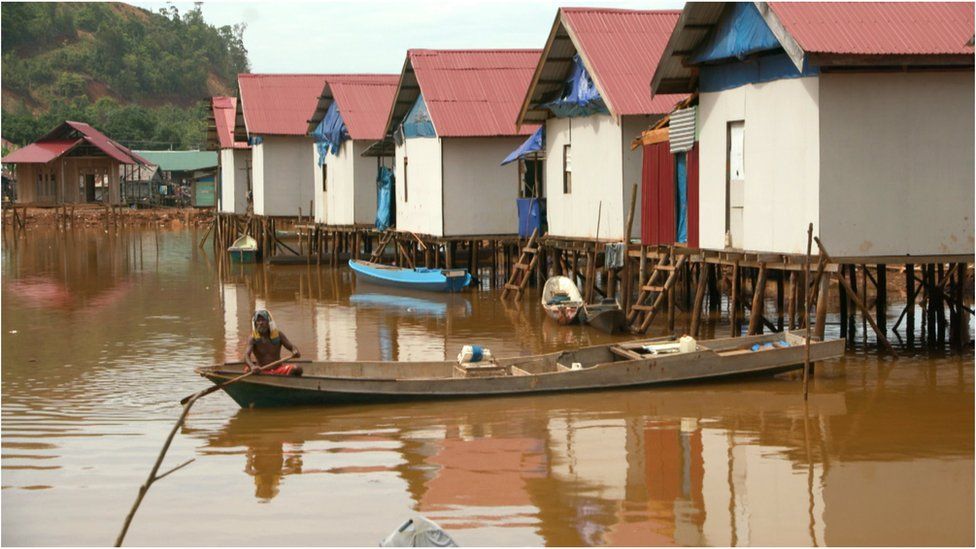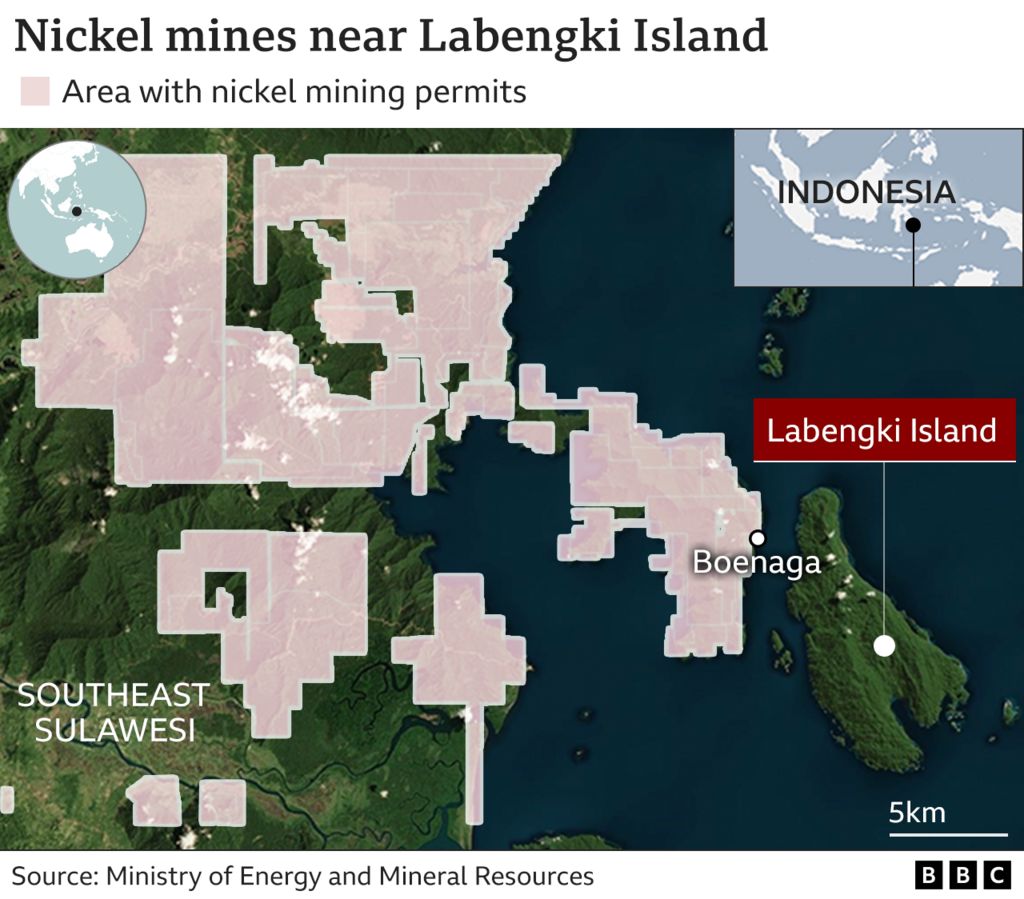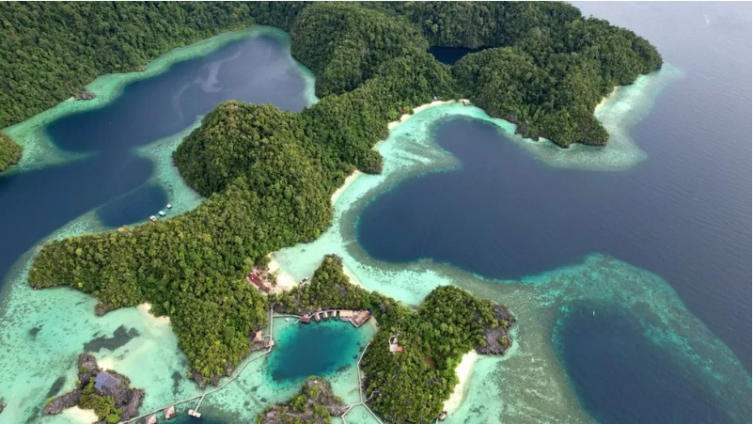Two men are carrying torches and homemade arrows as they slip into the ocean at night on an Indonesian island.
They are from an indigenous community of Bajau people - renowned freedivers who find it better to hunt in the dark when fish, lobsters and sea cucumbers are less active.
But they fear time is running out for their traditional way of life.
"Right now, the water is still clear," says Tawing, one of the fishermen. "But it won't stay that way… nickel waste enters our water during the rainy season and the current carries it here."
Nickel is an integral part of global life, used in stainless steel, mobile phones and electric car batteries. As the world shifts to greener vehicles and needs more rechargeable batteries, the International Energy Agency (IEA) predicts that demand for nickel will grow by at least 65% by 2030.
The IEA expects Indonesia, the world's largest nickel producer, to meet two thirds of the world's needs for the metal. The country has already signed deals worth billions of dollars with international players keen to invest in processing plants as well as mines.
But conservationists warn that mining could have a devastating effect on the environment.
Here on Labengki Island in Southeast Sulawesi, Tawing fears that if the government does not take action, waste from nickel mines will end up in the sea, damaging the island and surrounding marine life.
According to data from the Indonesian government, about 50 nickel mining companies currently operate in North Konawe Regency, across the water from Labengki Island.

The journey to get there takes us about an hour by boat. As we approach, the green hills are replaced by brown, deforested patches. Excavators and barges can be seen digging and carrying the "new gold". The water beneath us is a reddish-brown colour.
In the coastal village of Boenaga we meet Lukman, another Bajau fisherman, who says he can no longer fish near his home.
"We couldn't see anything underwater when we dived," he says, pointing at brown water at the back of his house. "We could hit a rock." The cost of fuel makes it impractical for him to travel further afield to fish and he says if they make a fuss the police end up getting involved.
In order to mine nickel, large areas of trees are cut down and the land is excavated to create open pits. With the roots of the trees no longer present to stabilise the ground, when it rains earth is more easily swept away.
Government data shows that in 2022 there were at least 21 floods and mudslides in Southeast Sulawesi. Between 2005 and 2008, before the proliferation of mines, there were two to three per year, according to the National Agency for Disaster Countermeasure.
Chemicals such as sodium cyanide and diesel can be also used in the mining process. That worries local conservationist Habib Nadjar Buduha, who says that when waste material and water are not properly managed, sediment ends up in the sea.
He showed me a video he shot about 10 miles along the coast, off Bahubulu Island, of a coral reef "suffocated" by sediment.

He is afraid that the same thing will happen in Labengki and in 2009 he founded a conservation group to protect giant clams. "They would never win against nickel pollution," he says.
"The sediment will bury and destroy them."
Individual nickel mining companies near Boenaga did not to respond to our requests for comment, but we did speak to the Indonesian Nickel Miners' Association - about half of the mining companies in North Konawe are members.
The secretary general, Meidy Katrin, says that in order to get a licence companies must agree to carry out reforestation or reclamation of the land when they have finished mining an area.
"The question is, are the companies doing it?" she says, admitting there are patches of bare land that have not been reforested. But she says this may not be the fault of companies with permits: "This area also has a lot of illegal mining activities."
She puts the onus on the government to check up on miners to make sure they are complying with the rules and ensure that what they put in their reports matches the reality.
The head of Boenaga village, Jufri Asri, sees things differently to Lukman and Habib. He believes the mines have brought benefits to his community. "Take the price of fish," he says. "I don't take fish to the city to sell because the price is higher here. These companies need fish too."
His 21-year-old son has a job at a nearby nickel mining company and, like other families in Boenaga, they receive a monthly compensation fee of at least $70 a month from the mines.
Financial agreements are common and are designed to offset any inconvenience caused by mining activity and heavy vehicles travelling past homes as they go to and from the pits. Jufri notes that if nickel production increases, the amount of compensation they get also goes up.

In the capital, Jakarta, we meet Novita Indri, a campaigner for Trend Asia, an NGO that promotes sustainable development. She blames the authorities for being "too weak" - she wants to see higher environmental standards and tougher regulation.
"We don't have a track record of sustainable mining yet," Indri says. "Indonesia has a lot of homework to do, strengthening law enforcement, increasing emission standards, and implementing environmental regulations."
When we put this to the adviser to the Ministry of Energy and Mineral Resources (ESDM), Professor Irwandy Arif, he tells us the government is concerned "about the impact of mining activities on coastal sedimentation", not just in this region but across Indonesia.
However he believes pollution is caused by illegal nickel mines, not licensed companies.
He insists regulations mean that legitimate operators have water management systems in place to ensure nothing dangerous ends up in the sea and he does not believe they would ignore the rules and risk losing their permits.
But Prof Arif acknowledges that at illegal mines without treatment systems "the soil will just be eroded".
He tells us that anyone who doesn't comply with the regulations is prevented from selling nickel and that two illegal miners have been taken to court in the North Konawe Regency - the area where Boenaga is located.
But Prof Arif admits supervision needs to improve: "Illegal mining exists everywhere in Indonesia," he says. "So far we have not managed to regulate it properly… we need to map which ones are legal and which ones are illegal so that we can minimise this environmental damage."
He points out that in order to try to improve the situation, the government recently established a national illegal mining taskforce.
But many of the Bajau people we spoke to say change is not happening quickly enough. If things continue as they are, conservationist Habib warns that the damage could be irreversible.
"What they are destroying is our future," he says.
Latest Stories
-
IMF projects 4% growth rate for Ghana in 2025
35 minutes -
Livestream: Newsfile discusses suspension of CJ and galamsey
36 minutes -
ASFC 2025: CAF President Dr Motsepe arrives in Ghana for finals and key meetings
45 minutes -
Plan International Ghana applauds government’s move to tackle menstrual poverty
46 minutes -
+233 hosts Int. Jazz Day concert on May 3
48 minutes -
Finance Minister meets IFC MD to deepen cooperation in key sectors
2 hours -
PUWU hoists red flags nationwide over gov’t plan to privatize ECG and NEDCo
11 hours -
Kwame Yesu’s latest project blends raw emotion with rap precision
12 hours -
Court remands Mobile Money robbery suspect into police custody
13 hours -
BIDEC and Ghana Dance Association engages Ghana Tourism Authority on dance tourism
13 hours -
Ghana pushes forward with National AI policy through multi-stakeholder engagement
13 hours -
Mahama pays tribute to late Pope Francis
13 hours -
W/R police clamp down on crime: Suspects arrested for vehicle theft, gold robbery, galamsey
13 hours -
This Saturday on Newsfile: Chief Justice suspension and galamsey take centre stage
14 hours -
GIMPA GRASAG inaugurates study rooms, business centre to support academic work
14 hours

